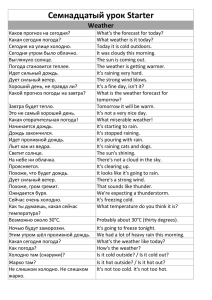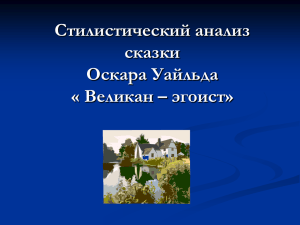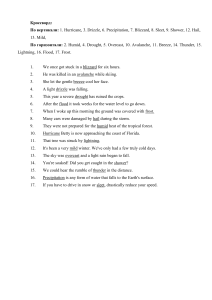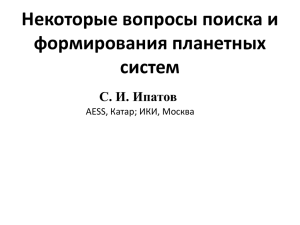TEXT 1
advertisement

UNIT 11 ______________________Ученик BASIC GRAMMAR OF UNIT 11 a) The Future Indefinite Tense (Будущее простое время) b) The Future Continuous Tense (Будущее продолженное время) c) Модальные глаголы в Будущем простом времени d) Условные предложения THE FUTURE INDEFINITE TENSE (Будущее простое время) Тип предложения Пример I shall go to the country tomorrow. He will work on Saturday. Повествование Will you be at home tomorrow? What will he do next weekend? Вопрос I shall not see her tomorrow. She will not watch TV. Отрицание THE FUTURE CONTINUOUS TENSE (Будущее продолженное время) Тип предложения Пример I shall be meeting you at the station. She will be reading a book at 5 o'clock. Повествование Вопрос Will he be watching TV when mother comes? I shall not (shan't) be writing a letter. He will not (won't) be having dinner at 4. Отрицание МОДАЛЬНЫЕ ГЛАГОЛЫ В БУДУЩЕМ ПРОСТОМ ВРЕМЕНИ Модальны й глагол Повествование Вопрос Отрицание CAN He will be able to help you. He will manage to help you. Will you be able to help me? She will not be able to Will you manage to help me? help you. She will not manage to help you. MAY They will be Will she be allowed to go to allowed to go to the the cinema? cinema. He will not be allowed to go to the cinema. MUST I shall have to work Will you have to work hard? hard. They will not have to work hard. УСЛОВНЫЕ ПРЕДЛОЖЕНИЯ Тип предложения Повествование Вопрос Отрицание Пример Перевод I shall do it you ask. Will you go with us if He will not go for a walk Я сделаю это, если ты попросишь. the weather is Ты пойдешь с нами, если nice? будет хорошая погода? it is hot. Он не пойдет гулять, если будет жарко. Показатели условных предложений: if, when, as soon as, before, after, on condition that... 1 Аракин В.Д. Книга 1 UNIT 11 ______________________Ученик GRAMMAR EXERCISES I. Change each of these sentences using the Future Continuous: 1. At 10 o’clock he was still working at the laboratory. 2. My friend was preparing for her written test when I came. 3. Were you waiting for me at the station at 8 o’clock in the morning? 4. Was his friend giving a lesson at 5 o’clock? 5. My nephew was repairing our vacuum-cleaner at 7. 6. My uncle was listening to the news when I went to bed. 7. My aunt was knitting the whole morning. II. Write questions to the parts of the sentences in bold type: 1. He will begin his lectures next month. 2. My brother will go to India for six months. 3. My sister will go to the South because of her child’s illness. 4. It will take me 20 minutes to get to her house. 5. I shall be waiting for you at the station. 6. It will take two years to build this theatre. 7. It was snowing hard when I got up this morning. 8. I shall be able to translate this article next week. 9. He will see her at 9 o’clock tomorrow. 10. I shall get up tomorrow at 6 o’clock. 11. He will stay in the country for two months. 12. I shall be able to go to the canteen after the lesson. 13. I shall have to repair my aunt’s iron tomorrow. 14. I shall be having dinner soon. III. Use the correct form of the verb in the adverbial clauses of time and condition: 1. If you (to translate) this article into Russian, I shall use it in my report. 2. If she (to be) in Moscow now, she will meet you. 3. If you don’t (to hurry), you will miss the train. 4. If it (to rain), we shan’t go to the country. 5. When my friend (to come) to Moscow we shall go to the Bolshoi Theatre. 6. What will you be doing when he (to come) to your place? 7. Don’t forget to pay for your dinner before you (to leave) the canteen. 8. I shall be able to translate this article if you (to give) me a dictionary. 9. You will have to work hard at the laboratory if you (to miss) the lesson. 10. Where will you go when you (to come) to Moscow? 11. You will lay the table as soon as Mary (to wash) the dishes. 12. I shan’t have dinner before mother (to come) home. IV. Use the following sentences in indirect speech. Make other necessary changes: 1. He says: “I am sure she will come in time.” 2. She says: “I shall be able to read English newspapers without a dictionary in a year.” 3. They say: “We shan’t go to the Institute on Sunday.” 4. Mr. Sandford says: “I shall have to pay much money for the house.” 5. Peter says: “I’ll be waiting for you at the station.” 6. Mary says: “I’ll be back soon.” 7. She says: “What are you going to do when you come home?” 8. She says: “I hope I’ll soon speak English as well as you do.” 9. He says: “I am sure it will rain tomorrow.” 10. They say: “We’ll go for a walk if it is hot tomorrow.” 11. She says: “I am busy today but I’ll be much busier tomorrow.” 12. Jane says: “I shall come earlier tomorrow.” 13. John says: “I shan’t be able to meet them tomorrow.” 14. He says: “I’ll come if I am free.” 15. She says: “I’ll go to the cinema in the evening if I am not very tired.” 16. My mother says: “You’ll be sleepy tomorrow if you don’t go to bed at once.” 17. My aunt says: I shan’t be thirsty if I have some grapes.” 18. My mother says: “Don’t serve dessert before I clear the table.” V. Change the following sentences using the Past and Future Indefinite: 1. You must practice this text in the laboratory. 2. You must take your exam in English. 3. She can translate this article without a dictionary. 4. They can’t meet them at the station. 5. The doctor must examine this child. 6. He must work systematically if he wants to know French well. 7. This child must spend more time out in the open air. 8. I can’t recite this poem. 9. You must take part in this work. 10. He can’t join the party , he is busy. 2 Аракин В.Д. Книга 1 UNIT 11 ______________________Ученик TEXT 1 SEASONS AND WEATHER When two Englishmen meet, their first words will be “How do you do?” or “How are you?” And after the reply “Very well, thank you: how are you?” the next remark is almost certain to be about the weather. “It’s a lovely morning, isn’t it?” or “Isn’t it hot today?” and the other person will reply “Yes, it’s wonderful weather we are having. I hope it will keep fine, it seems almost too good to last.” Or perhaps the day is dull, it is raining a little, the sky is grey, and everyone is wearing a mackintosh or carrying an umbrella. As the cars and buses go along the street, they splash the water and mud on the passers-by. Gradually it gets darker: a thick fog is spreading over London. The lamps are lit in the streets and in the shops and offices; cars and buses put on their lights and can only crawl along. As one friend bumps into another, he says, “Isn’t it a beastly day?” – “Yes,” replies the other, you can hardly see a yard in front of you.” Then comes winter. There has been a good fall of snow and a hard frost. It is just the day for a good country walk; let us have a tramp down the country lanes. The ground is like iron and rings under our feet, the frost sparkles on the branches, and icicles hang from the houses. It is still freezing hard and the ponds are frozen over. There are crowds of people on them sliding and skating, and here is a merry group of schoolboys having a fight with snowballs. It is very pleasant while the frost lasts; the unpleasant time comes when the thaw begins. A few months have passed and it is a beautiful spring day. The rain fell heavily last night, but now the soft white clouds are floating across the blue sky, and the sun is shining brightly. Raindrops and dewdrops shine on every small green leaf and every blade of young grass. The farmer has ploughed his fields and the new corn is just beginning to appear above the ground. In a few months autumn and harvest time will come. When the corn has turned ripe and golden the farmer will reap it and put it in his barn. TEXT 2 DIALOGUE WEATHER TALK Leon: Lovely day today, isn’t it? George: It is. There’s hardly a cloud in the sky in fact. Leon: We’ll have a heat wave, I fear. It must be 25 degrees in the shade. George: It is very close today. Not a leaf is stirring. Leon: There’s hardly a breath of air. George: By the way, I’ve just read the weather-forecast in my newspaper here. Leon: What does it say? George: (reading) “pressure will remain high to the south-west of the British Isles. There will be occasional rain or drizzle, but bright weather with a few scattered showers will spread to England and Wales”. Leon: I fear a thunderstorm is coming. George: The sky is overcast and the sun is going in. Leon: It looks like rain. Actually it’s beginning to rain. And I have left my umbrella at home. It never rains but it pours! George: Fortunately enough, I’ve got my folding umbrella with me. Let me put it up. Leon: What a tremendous clap of thunder! George: And what a flash of lightning! Leon: But the English have a saying about the weather: If you don’t like it now, just wait a bit. George: Look! It’s clearing up. The clouds are lifting. Leon: It has stopped raining. Look at this wonderful rainbow! George: Bright sunshine again. Now I know why English weather is something worth talking about. VOCABULARY NOTES keep (kept, kept) держаться; оставаться (в известном состоянии); to keep fine, e.g. The weather kept fine. dull пасмурный; Ant. bright splash забрызгивать, брызгать(ся), e.g. The driver splashed mud on the passers-by. 3 Аракин В.Д. Книга 1 UNIT 11 ______________________Ученик fog туман; a thick fog густой туман; foggy туманный, e.g. It is foggy. spread (spread, spread) простираться, расстилаться e.g. A green valley spread before us; to spread over smth., e.g. The water spread over the floor. light (up) (lit, lit/lighted) зажигать(ся), освещать, e.g.The lamps are lit in the streets. Our houses are lighted by the electricity. beastly ужасный, противный; Syn. nasty; beast – зверь, животное hardly с трудом, едва; e.g. I could hardly understand her. hard сильно; Syn. heavily e.g. It is raining hard (heavily); hard сильный a hard frost frost мороз; frosty морозный; freeze (froze, frozen) замерзать, покрываться льдом; e.g. It’s freezing hard. sparkle сверкать; Syn. shine icicle сосулька slide (slid, slid) скользить; кататься по льду thaw оттепель float плыть (по течению, по воздуху), e.g. A lot of red and green balloons floated in the air. harvest жатва, уборка хлеба; урожай degree градус, e.g. We had 25 degrees above (below) zero yesterday. close душный, e.g. Open the window. It’s very close here. Syn. stuffy breath дыхание; дуновение, e.g. At last we felt a breath of fresh air; breathe дышать, e.g. The child was breathing hard. weather-forecast прогноз погоды remain оставаться, e.g. In England the fields and the parks remain green even in winter; Syn. stay drizzle мелкий дождь, изморось; e.g. It’s drizzling thunderstorm гроза; thunder гром; a clap of thunder удар грома overcast покрытый облаками; хмурый (о небе) pour лить, литься; наливать, e.g. It’s pouring. Льет дождь Pour yourself a cup of milk. fortunately к счастью; Ant. unfortunately tremendous страшный, громадный; Syn. awful, terrible lightning молния, e.g. A flash of lightning lit up the sky. worth заслуживающий, стоящий; to be worth doing smth., e.g. It’s not worth thinking about. TOPICAL VOCABULARY Seasons: winter, spring, summer, autumn Weather conditions: cold, warm, cool, hot, rather cold, chilly, frosty, mild, rainy, snowy, windy, cloudy, foggy, dull, fine, lovely, fair weather, wonderful, changeable, pleasant, wet, terrible, beastly, oppressive heat, bitterly cold, unpredictable. Acts of nature: (heavy) rain, fog, (layer of) snow, (a clap of) thunder, (local) thunderstorm, storm, (heavy) clouds, black clouds, (a flash of) lightning, (a gust of) wind, drizzle, sleet, flood, tornado, hurricane, bright sunshine, heat, pressure, flakes of snow, fall of snow, (hard; severe) frost, hoar frost, slush Verbs: to rain, to snow (heavily), to shine brightly, to blow, to clear up, to be overcast, to melt, to pour Nature: nature awakens (the awakening of nature), fragrant, the trees are in full bloom, cherry blossom, buds, to shoot out new leaves, meadow, migrant birds, Indian summer, flowerbed, soil, nightingale, nest, to lay and hatch eggs, cornfields, cornflowers, daffodils, poppies Activities: to till the soil, to sow the seeds, to reap, to bathe, to swim, to be out-of-doors, to cycle, to boat, to fish, to roller-skate, to lie in the sun, to play with a ball, to play tennis, to play chess (a game of chess), to pick flowers, to gather berries and mushrooms, to walk in the rain (under the umbrella), to travel by car, to be at the seaside, on the beach, on the bank of the river, to ice-skate, to toboggan, to ski, skating-rink CONVERSATIONAL PHRASES Questions: I wonder what the weather is going to be? What is the weather like today? What is outdoors? How is the weather? Is it raining? What is the weather-forecast for tomorrow? 4 Аракин В.Д. Книга 1 UNIT 11 ______________________Ученик Weather remarks: What a marvelous (shocking) day! I am sick and tired of this rain It seems to be getting more settled (clearing up), Wet to the skin doesn’t it? I got wet through It’s very windy (mild, wet, stormy) today. It is going to rain I’ll be glad when the rain’s over (the fog’s cleared), To get caught in the rain won’t you? All of a sudden... It’s nice (cold, warm, chilly, hot), isn’t it? It didn't look like rain The sky is blue and cloudless It is sure to rain The sky is grey and cloudy The wind has dropped The sun is shining brightly in the sky It grows warmer It is raining cats and dogs Flowers begin to blossom There is no sign... The ground is covered with fallen leaves It will last... There was not a cloud in the sky The weather has changed The sun is pouring into the room In our parts... Not a drop of rain ever fellow-students Hesitation devices: um, er, well, actually, in fact, you see, you know, the thing is, it’s like this, how shall I put it, I think…, believe…, I suppose. Memory work: When the weather is wet We must not fret,When the weather is cold We must not scold. When the weather is warm We must not storm,But be thankful together Whatever the weather. TWILIGHT (by G. G. Byron) It is the hour when from the boughs The nightingale’s high note is heard. It is the hour when lovers’ vows Seem sweet in every whispered word. And gentle winds and waters near Make music to the lonely ear. Each flower the dews have lightly wet, And in the sky the stars are met: And on the wave is deeper blue, And on the leaf a browner hue, And in the Heaven, that clear obscure So softly dark and darkly pure, That follows the decline of day As twilight melts beneath the moon away. СУМЕРКИ Это час, когда среди ветвей Трель свою выводит соловей, Это час, когда влюблённых клятвы Так нежны и сладостно приятны, Когда каждое прошептанное слово, С губ едва слетев, исполниться готово. Слышен шелест ветра, шум листвы, Словно музыка, мелодия мечты… На лепестках цветов лежит роса, Звезда звезду встречает в небесах. И стал нежней и глубже цвет волны, И ночи тень легла уж средь листвы, А неба так прозрачна темнота, Так призрачна она и так чиста… В тот час, что за закатом дня спешит И меркнет пред луной, и от неё бежит… EXERCISES I. Give the four forms of the following verbs: come, blow, drive, fall, prefer, freeze, ski, put, sweep, hang, show, sew, awake, sleep, build, stop, sit, read, write, play, leave, begin, become. 5 Аракин В.Д. Книга 1 UNIT 11 ______________________Ученик II. Give the degrees of comparison of the following adjectives and transcribe them: dark, heavy, hard, large, old, severe, pleasant, bad, good, strong, weak, little, far, near, late, clear, hot, warm, beautiful. III. Look at the picture (No.1,2) and answer the following questions: 1. Which of the four seasons is it? 2. Is the sky overcast with heavy clouds or is it clear and bright? 3. Has the sun gone in or is it shining brightly? 4. What is the ground covered with? 5. Are the fruit trees in blossom? 6. Do you see any flower-beds in the picture? 7. Who do you see in the picture? 8. What are the grown-up people doing? 9. What are the children doing? 10. Do people stay at home in spring or do they prefer to go out into the garden? 11. How do you like to spend your time in spring? IV. Describe the picture (No.3,4) using the following words and word combinations: autumn; weather; nasty; the sky; to be overcast; cold; wind; to blow; low clouds; to drive across the sky; to rain heavily (hard); to hurry along the streets; to wear raincoats; to carry an umbrella; to get wet through; cars; trolley-buses; buses; to go (run) along the streets; to splash; mud; passers-by. 6 Аракин В.Д. Книга 1 UNIT 11 ______________________Ученик V. a) Make the following sentences interrogative and negative: 1. It is as chilly today as it was yesterday. 2. The frost will be as hard tomorrow as it is today. 3. She is as fond of frosty weather as her brother is. 4. It has stopped raining. 5. She will be working when you come. 6. Pressure will remain high. b) Ask one another questions on the following sentences and answer them in the negative. Add a sentence or two to develop a situation. Use conversational phrases. 1. It’s coming on to pour. 2. There was a good fall of snow yesterday. 3. It’s still freezing hard. 4. The rain fell heavily last night. 5. It was foggy yesterday morning. 6. It’s clearing up. 7. The clouds are lifting. 8. I’ve got my folding umbrella with me. 9. A thunderstorm is coming. 10. I’ve just read the weatherforecast. VI. Put the adjectives and adverbs in brackets in the required degree of comparison: 1. Today the frost is (severe) than it was yesterday. 2. This book is (interesting) of all I have read this year. 3. It snows (hard) this winter than it did last winter. 4. January is (cold) month of the year. 5. My sister speaks English (bad) than I do. 6. Which is (hot) month of the year? 7. Which is (beautiful) place in this part of the country? 8. This nice-looking girl is (good) student in our group. 9. Does this sportsman run (fast) than you? – Oh, yes, he is (fast) in our group. 10. The students of our group will have (little) spare time this term and I (little) of all as I’ve got (much) work at the scientific society. VII. Fill in prepositions or adverbs: A. 1. Be careful! Don’t splash mud … passers-by. 2. A thick fog is spreading … the city and though cars and buses have put … their lights they can only crawl … . 3. It is pleasant to look … the trees when the frost sparkles … the branches. 4. There is a bridge … the river. 5. The rivers and lakes freeze … winter. 6. I don’t like to be out-of-doors … such bad weather. I prefer to stay … home. 7. Let us have a tramp … the country lanes. 8. The new corn is just beginning to appear … the ground. 9. The ground is usually covered … snow … winter. B. 1. The temperature is 25 degrees … zero … the shade today. 2. Look … the sly. There is hardly a cloud … it. 3. A heat wave will spread … the south-west … Moscow. 4. It’s beginning to rain. Put … your umbrella. 5. The rain is … and it’s clearing …. 6. The weather is getting worse. The sun is going … . 7. Look … picture … page 25. What do you see … the picture? 8. It’s pouring. We shall be wet … 9. My aunt will stay … our place … two months. VIII. Complete the following sentences using the words in brackets: 1. The sky will be clear if the wind … (to stop). 2. I shall go to the country if the weather … (to be fine). 3. We shall go to the skating-rink if the frost … (to be not severe). 4. The snow will melt if the sun … (to be hot). 5. You will feel warm if you (to put on) a warm coat. 6. He will ring you up when he (to come) home. 7. The days will be longer when summer (to come). 8. I shall go home if it (to rain). 9. We look forward to the time when spring (to come). IX. Choose the right word: to stay-to remain 1. I have done three exercises and two … . 2. The place was so nice that we decided to … there all the summer. 3. Few leaves … on the trees and they are not green any longer. 4. He was so tired that he … in bed all day long. 5. The teacher tried to make the boy speak but he … silent. 6. It was raining so hard that I … at my friend’s the whole night. such – so 1. She was … tired that she couldn’t go on working. 2. I never go for … long walks. 3. I didn’t know that it was … an interesting book. 4. The student spoke English … badly that the teacher couldn’t give him even a satisfactory mark. 5. The weather was … nasty yesterday that I stayed at home all day long. 6. It rained … hard yesterday that I got wet through. 7 Аракин В.Д. Книга 1 UNIT 11 ______________________Ученик X. Complete the following sentences and add something to develop a situation: 1. I shall go skiing if … 2. The pond will be frozen over when … 3. The farmers will reap the corn when … 4. The unpleasant time comes when … 5. We shall go for a walk as soon as … 6. I’ll stay out-of-doors till … 7. She’ll be able to help you if she … 8. He’ll make good progress if … 9. I shall put up my umbrella when … 10. Don’t go out before…. XI. Translate the following into English: A. 1. Сегодня не такой туман, как вчера. Вчера туман был такой густой, что я боялась ехать на машине и предпочла идти в театр пешком. 2. Неприятно гулять, когда небо покрыто тучами и идет дождь, а автобусы и машины забрызгивают прохожих водой и грязью. 3. Какая сегодня скверная погода! Моросит дождь, и улицы такие грязные. 4. Небо потемнело, и с моря начал дуть холодный ветер. Но сегодня ветер не такой сильный, как вчера. Вчера он был гораздо сильнее. 5. Сильно подмораживает. Скоро пруд замерзнет, и мы сможем кататься на коньках. 6. Парк выглядит так прекрасно, когда земля покрыта снегом, а на деревьях сверкает иней. 7. Я не слышала прогноза погоды сегодня и не знаю, будет ли сегодня дождь. Если дождя не будет, я обязательно поеду за город. 8. Погода становится теплее, я думаю, что скоро зацветут (будут в цвету) фруктовые деревья. 9. Зерно начинает созревать. Скоро начнется уборка. Некоторые студенты нашего факультета поедут помогать убирать урожай. 10. Возьми плащ или зонт. Погода может измениться. 11. Сегодня очень холодно. Тебе придется остаться дома. Если ты выйдешь, ты опять простудишься и не сможешь посещать школу. 12. Я думаю, что он вам не позвонит до того, как вернется в Москву. 13. Завтра утром приезжает мой брат. Я не знаю, получу ли от него телеграмму, но даже если не получу, я поеду на вокзал встречать его. 14. Мы сможем обсудить наши планы в понедельник. 15. Вы не должны учить это стихотворение наизусть, пока вы не отработаете его в лаборатории. 16. Она не знает, закончит ли свою статью сегодня. Если закончит и если сегодня не будет дождя, мы пойдем в театр. 17. Я буду рада, если дождь прекратиться. Мне надо торопиться на вокзал. 18. Через час начнут прибывать первые делегаты. 19. В Англии поля и парки остаются зелеными даже зимой. 20. Посмотри! Выпало много снега. Завтра дети будут кататься на санках и лепить снеговика. 21. Как красиво! Капельки дождя и росы сверкают на листьях и на траве. 22. Я думаю, что дождь не будет продолжаться очень долго и мы сможем пойти в лес собирать грибы и ягоды. В. 1. Сегодня очень душно. Боюсь, что скоро будет гроза. 2. Эти ужасные раскаты грома разбудили меня ночью. Дождь лил как из ведра всю ночь. 3. Посмотри! Дождь перестал. Облака рассеялись. На небе красивая радуга. Надеюсь, будет хорошая погода. 4. Согласно прогноза погоды на этой неделе изредка будут выпадать дожди. 5. Идет сильный дождь, раскрой зонтик, а то ты совершенно промокнешь. 8 Аракин В.Д. Книга 1




